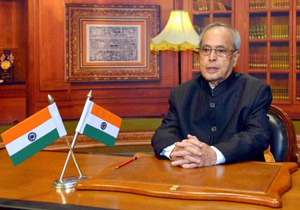New Delhi, Jan 25: President Pranab Mukherjee today said that ideally dialogue should be a continual engagement for resolving disputes among nations but peace cannot be discussed under a "shower of bullets".
In significant remarks that come against the backdrop of the Pathankot attack, he also said terrorism is a war beyond any doctrine and is a "cancer which must be operated out with a firm scalpel".
"There is no good or bad terrorism; it is pure evil," the President said in his address to the nation on the eve of 67th Republic Day.
Mukherjee said nations will not agree on everything but the challenge today is existential because terrorists seek to undermine order by rejecting the very basis of strategic stability which are recognised borders.
"If outlaws are able to unravel borders, then we are heading towards an age of chaos. There will be disputes among nations; and, as is well known, the closer we are to a neighbour, the higher the propensity for disputes.
"There is a civilised way to bridge disagreements; dialogue, ideally, should be a continual engagement. But we cannot discuss peace under a shower of bullets," he said.
Mukherjee said that the sub-continent has a historic opportunity to become a beacon to the world at a time of great danger.
"We must attempt to resolve the complex edges of the emotional and geo-political inheritance with neighbours through a peaceful dialogue, and invest in mutual prosperity by recognising that human beings are best defined by a humane spirit, and not their worst instincts. Our example can be its own message to a world in anxious need of amity," he said.
The President asserted that the optimism at the beginning of the 21st century that energies of people would be committed to a rising prosperity that would eliminate the curse of extreme poverty has faded in first 15 years.
"There is unprecedented turbulence across vast regions, with alarming increase in regional instabilities. The scourge of terrorism has reshaped war into its most barbaric manifestation. No corner can now consider itself safe from this savage monster," Mukherjee said.
He said terrorism is inspired by insane objectives, motivated by bottomless depths of hatred, instigated by puppeteers who have invested heavily in havoc through the mass murder of innocents.
Tracing the birth of Indian Republic in 1950, the President said India today is a rising power fast emerging as a global leader in science, technology, innovation and start ups and whose economic success is the envy of the world.





Comments
Add new comment